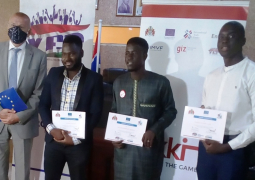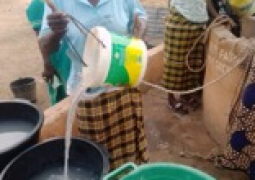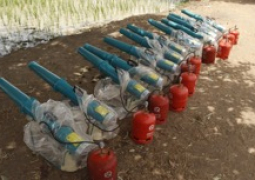The celebration was held at low key at state house, lasting just 15 minutes in observance of guard of honour to raise the flag.
President Sall put economic and social resilience programmes in place to strengthen the health system, help businesses and the diaspora.
He disclosed that 64.4 billion CFA will be injected into the health sector, while 15.5 billion will be used for the payment of electricity bills and 3 billion for water bills. These funds are meant for families in need.
He also underlined a staggering 59 billion for the purchase of food for poor families. Another 12.5 billion CFA will be used to help the diaspora.
The 302 billion is meant for suppliers (eco sector) of the state, while100 billion is designed for hotels, agriculture and transport. The public treasury will also be taken care of.
SMEs and businesses operating in the affected private sector with less than 100 million in turnover have the possibility to defer their tax payment until 15 July, 2020.
The general VAT pay deadline is brought to
24 months instead of 12 months.
Collection of the tax – debt by customs is suspended for companies whose sectors are affected by the crisis. At least 200 billion is designed for the financing of the affected companies.
Tax rebate for companies that keep their employees or pay at least 70% of wages during this crisis.
The 175 billion put into the state budget is shelved to absorb losses. The covid-19 response programme also aims to supply the country with hydrocarbons, foodstuffs and medicines.
Entreprises and companies that have donated for the fight against covid-19 will be also be considered for tax deduction.
State operating and investment expenses are reduced by up to CHF 100 billion.
Collection of the tax debt by customs is for companies whose sectors are affected by the crisis.
Meanwhile the minister of Health, Abdoulaye Diouf Sarr yesterday said that there were 3 new cases bringing the total to 222 positive cases, two deaths and 82 treated.
There are 8000 positive cases in Africa with 400 deaths.
Chinese scientists make progress in developing coronavirus vaccine, antibody drugs
An adenovirus vector vaccine and mRNA-based antibody drugs against covid-19 developed by Tsinghua University have made significant progress and are expected to enter animal trials to test the feasibility and safety at the end of May, Chinanews.com reported.
At a press conference held in Beijing on Wednesday, Deng Ning, deputy dean of Tsinghua University’s Office of Scientific Research & Development, said that a research team of the university, led by Zhang Linqi from the university’s medical school, has successfully isolated more than 200 strains of covid-19 antibodies with high neutralisation ability, along with their coding genes from the blood of recovered patients.
With the support from the Ministry of Science and Technology, the Ministry of Education and Beijing municipality, the team has launched a partnership with two pharmaceutical companies on research, development, medical trials and production of the vaccine. The vaccine and antibody drugs will be tested on animals by the end of May, according to Deng.
Tsinghua University has organised eight research teams responsible for finding effective approaches to combat the covid-19 epidemic, with researches covering preventive and diagnostic detection techniques, highly-sensitive PCR test kit techniques, antibody vaccines and drugs, indoors and building air disinfection techniques, protein-based virus transmission blockers, stem cell anti-inflammatory therapies, as well as epidemiological research and psychological rehabilitation systems.
The university also will establish a long-term mechanism for epidemic forecasting and early warning, based on big data and artificial intelligence, as well as a platform to promote the innovation and industrialization of medicine.
By Zhao Shiyue | chinadaily.com.cn |





